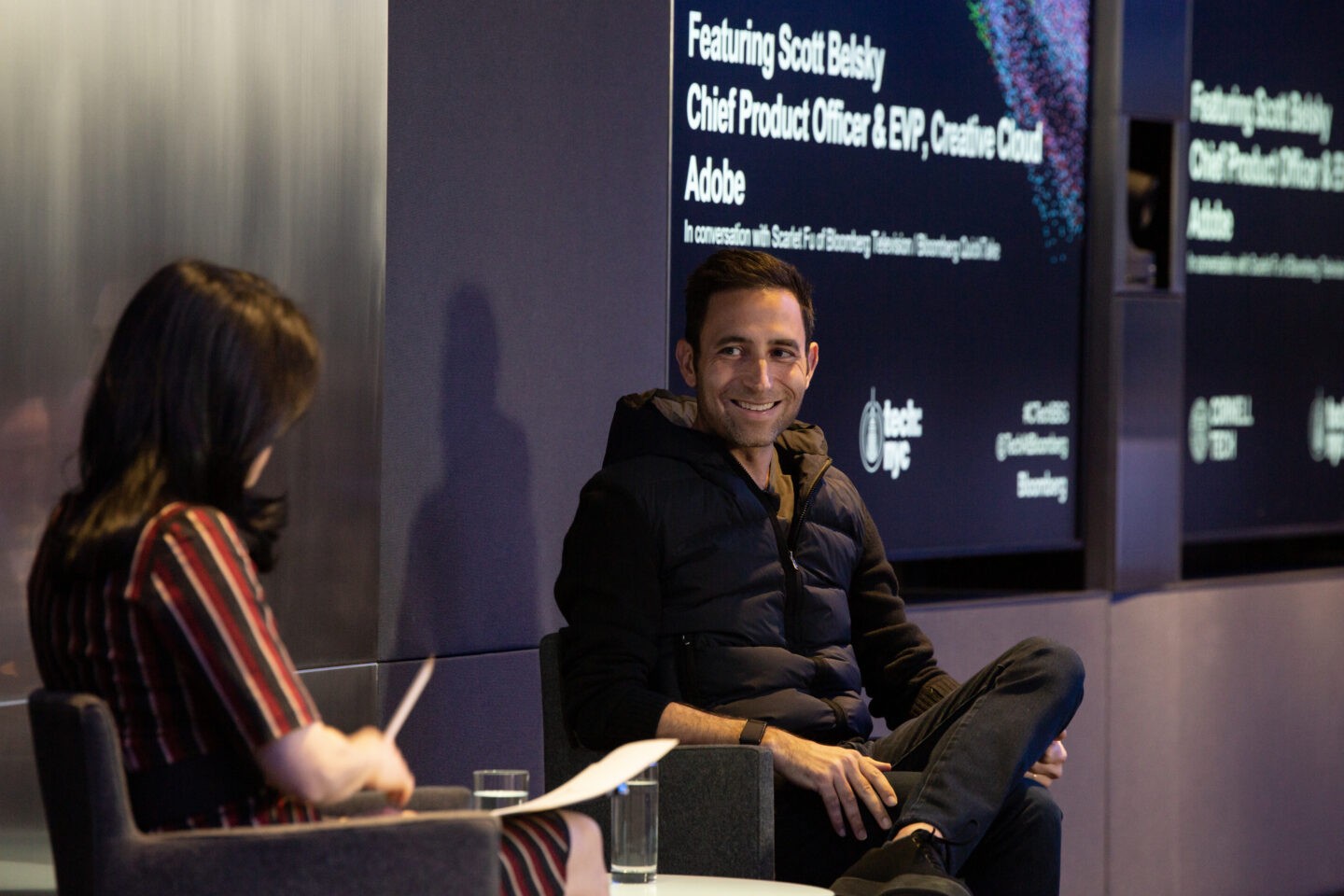9 Lessons to Inspire Women Entrepreneurs

The stats are in. Women-led startups are on the rise. In fact, some studies have shown that companies with gender diversity on their founding team perform better than all-male teams.
In the most recent Cornell Tech @ Bloomberg speaker series, three successful female entrepreneurs shared their “tales from the top” with Cornell Tech students, Bloomberg employees and the New York City tech industry.
Scarlett Fu, the anchor of “Bloomberg Markets” asked the panel hard-hitting questions that exposed the challenges and biases that female founders face as they are building and scaling their businesses. Katia Beauchamp, CEO and co-founder of Birchbox, Brit Morin, CEO and founder of Brit + Co, and Nadia Boujarwah CEO and co-founder of Dia & Co shared personal anecdotes and actionable advice for the next generation of female (and male) entrepreneurs.
Here were the key takeaways from the honest, yet optimistic, discussion:
On Fundraising:
Brit Morin: “You have to be yourself, and use that to your advantage. I was squarely in the middle of the demographic I was trying to reach. I understood that psychographic more than any of the investors that were investing in the company. You can be authentic and think about the strengths of who you are and use those experiences to leverage yourself in those conversations.”
Nadia Boujarwah: “It’s hard to look at the numbers and not see that the cards are stacked up against female founders. We’re also building companies that are for women, so not only is it a problem with interacting people at the founder level as a venture capitalist but also getting them to see why the product you are bringing to market serves such a profound need for a customer that is very foreign to them and makes it very challenging to pitch as a women.”
On Networking:
Katia Beauchamp: “I cold emailed every CEO in the beauty industry that you can imagine. I started my cold emailing hobby with Steve Jobs, and he got back to me right before I went to business school. It works. My recipe for cold emailing is as follows: a very compelling subject line, an email you can read without scrolling on a smartphone, and no business plan attached. We had a one-pager to find out more. And you ask for something that is pretty hard to say no to, which in our case, was: “Do you have five minutes to give me advice?” And then that turned into a meeting, and that turned into a pitch, and that turned into partnerships with big companies like Kiehl’s.”
Brit Morin: “It’s a matter of hustling. It’s pure hustling. It’s getting out there and meeting people. Cold tweets also work well. Send them metrics, send them a tweet with that perfect hockey stick graph.”
Nadia Boujarwah: “It’s very hard to pitch a business in the concept phase as a woman, but what everyone understands is traction. One of our first goals was to do whatever we could to prove that they didn’t have to believe us — the proof was in the pudding. And we did that. With investors, if you can go beyond belief to the rational stage, they’ll make the rational decision in the end. You just have to get past that hurdle.”

On Success and Skepticism:
Nadia Boujarwah: “Have audacious goals. Talk about building a big business. Talk about wanting to create massive wealth. Talk about wanting to change the world, not just because you have a mission, but because you have a capitalistic view on life and there is change that can happen through capitalism. The more that we emphasize that these things are important to us as female founders, the more people will come to expect that.”
Brit Morin: “Women are more realistic when it comes to what they are going to achieve and when they are going to achieve it. A lot of men carry bigger egos so their three year plans may sounds totally insane…but they sound as though the are confident and believe it. There haven’t been many female entrepreneurs with multi-million dollar investments. We need more women who are successful to give the industry more confidence that the rest of us are going to achieve those exits as well. We’re getting there.”
Katia Beauchamp: “I’ve found that as you get further and further down the line, there is skepticism about if you are grounded enough, whereas as with a man it’s seen more as being a visionary. When you’re talking about creating multi-billion dollars in value, there is a skepticism that isn’t as present for men.”
On Being Customer-Centric:
Katia Beauchamp: “How can you not think about the customer? The world is doing the work for you. If you don’t think about your job as staying relevant to your consumer, then you’ve missed the point. That is our vision: to be powerfully relevant through deep respect, and we think that is a completely different way to think about building a consumer product company.”
Nadia Boujarwah: “We believe that you create value for your business by actually resonating with the customer and it’s your responsibility as a CEO to build your product around your customer. These are emotional products where you want to build deep connections with your customer. That’s how the businesses that have changed the world have succeeded.”
Brit Morin: “Always look at the data and focus on what your customer is telling you.”
On Having a Narrow Focus:
Nadia Boujarwah: “Focus begets success. We don’t choose markets at random. We choose markets that are large, and then we focus on them. I think that’s the most rational way to build a business. As you perfect a market, you earn the right to expand into other markets as long as you do it in a way that is authentic to your brand.”
On Taking it Personally:
Katia Beauchamp: “It is extremely difficult to have distance between who you are and what you’ve built. It is such a roller coaster and any given day you can have 18 highs and 70 lows. It’s never a good day or a bad day — it’s not that simple. When so much of your self-worth is wrapped up in the business and you care so much about it, everything feels personal. But you can bring love into what you do.”
Brit Morin: “I put my name in the business, so there is a lot of personality there. I did that because I am so passionate about what I am building. It also kept me on track with how we grow and develop as a business. We stay true to who we are because I feel so passionate about our mission and our cause that I don’t want to put my name on the line to take us off course.”
On Living in the Moment:
Katia Beauchamp: “The thing I didn’t understand was what it would do to my productivity to actually rest. And rest is different from sleep. The first four years of Birchbox, I was never not thinking about Birchbox. Now I have about two hours of my day and all of my weekends [with my kids] to have these moments that are not about work. I rest my brain and am more creative.”
Nadia Boujarwah: “I think there is an opportunity in life to do many things, and the most important thing as a female professional is to stay focused on what you’re doing right now and begin to focus on the next step when you’re in the next step. As long as you live only one moment at a time, a lot of the anxiety and the worry and pre-planning can dissipate.”
The Worst Advice They’ve Received:
Brit Morin: “Why didn’t you start this with your husband? They thought that my husband would help propel my business to be even more successful. The notion of needing to rely on anybody, especially your husband or a man was pretty terrible advice. I said I’m confident enough to do this myself and, in fact, he knows nothing about media.”
Nadia Boujarwah: “The worst advice we get comes from anyone who gives us advice on our customer who isn’t our customer. Politely declining advice is critical as a founder.”
Katia Beauchamp: “Do we really need the box?”
On Helping Other Women:
Katia Beauchamp: “My biggest advice to women is that nobody has all the answers. I don’t have all the answers. I’ve made countless mistakes. The difference between someone who is an entrepreneur, and someone who is an aspiring entrepreneur, is that you will make the decision. You will pursue something and you will try to make it into the right decision but if that doesn’t work, you pivot.”
Brit Morin: “Women entrepreneurs I’ve met all care deeply about supporting each other and helping the next class. There is an inner club of women who care about supporting other female entrepreneurs.”
Watch the full video.
Read more on Tech at Bloomberg.
Media Highlights
Tech Policy Press
Content Moderation, Encryption, and the LawRELATED STORIES





